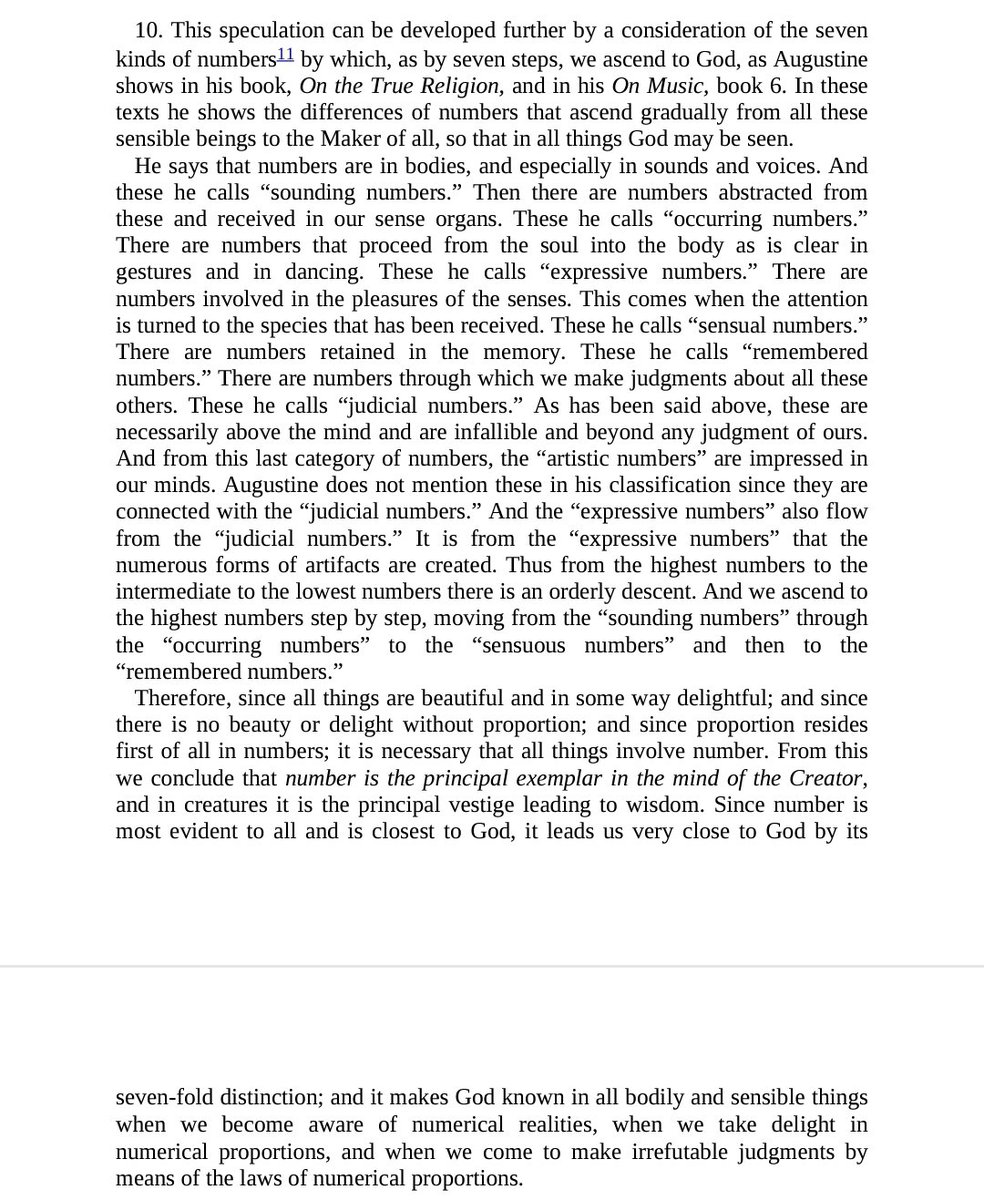📄 St. Teresa of Ávila on praying the Our Father
Just as the sacraments confer the grace they signify, prayer turns and draws the soul to the one signified. The Divine Beauty of the Our Father is evident here as Divine in efficient (Mt. 6:9-13), formal, material and final cause:

Just as the sacraments confer the grace they signify, prayer turns and draws the soul to the one signified. The Divine Beauty of the Our Father is evident here as Divine in efficient (Mt. 6:9-13), formal, material and final cause:


From Christ, ordered by Christ, spoken by Christ, ordered to the Father by Christ. Thus is God signified as object (v. 9), glory in Himself, "Our Father who art in Heaven hallowed be Thy Name."
Thus is God signified as glory radiant in salvation history to be consumated. Grace given in the present and radiant in creation that speaks of it's creator; which Providence governs and the soul conforms (v. 10)
"Thy Kingdom come, Thy will be Done on Earth as it is in Heaven."
"Thy Kingdom come, Thy will be Done on Earth as it is in Heaven."
St. Teresa further notes that the Kingdom here on earth is the Church Militant united in the sacraments while the Church Triumphant is the Kingdom of Heaven. (Way of Perfection, c. 30) 





Thus is God signified in His sacramental and intimate beneficence; His presence in the Eucharist and is giving of life and sufficient sustenance (v. 11).
"Give us this day, our daily bread."
"Give us this day, our daily bread."
Special care is to be given to this verse of the Pater Noster as St. Teresa of Ávila tells us (cf. Way of Perfection, c. 33) as it signifies God's intimate knowledge of our weakness in this life, "for our very life on our not disregarding it."
The Doctor of Prayer continues:



The Doctor of Prayer continues:


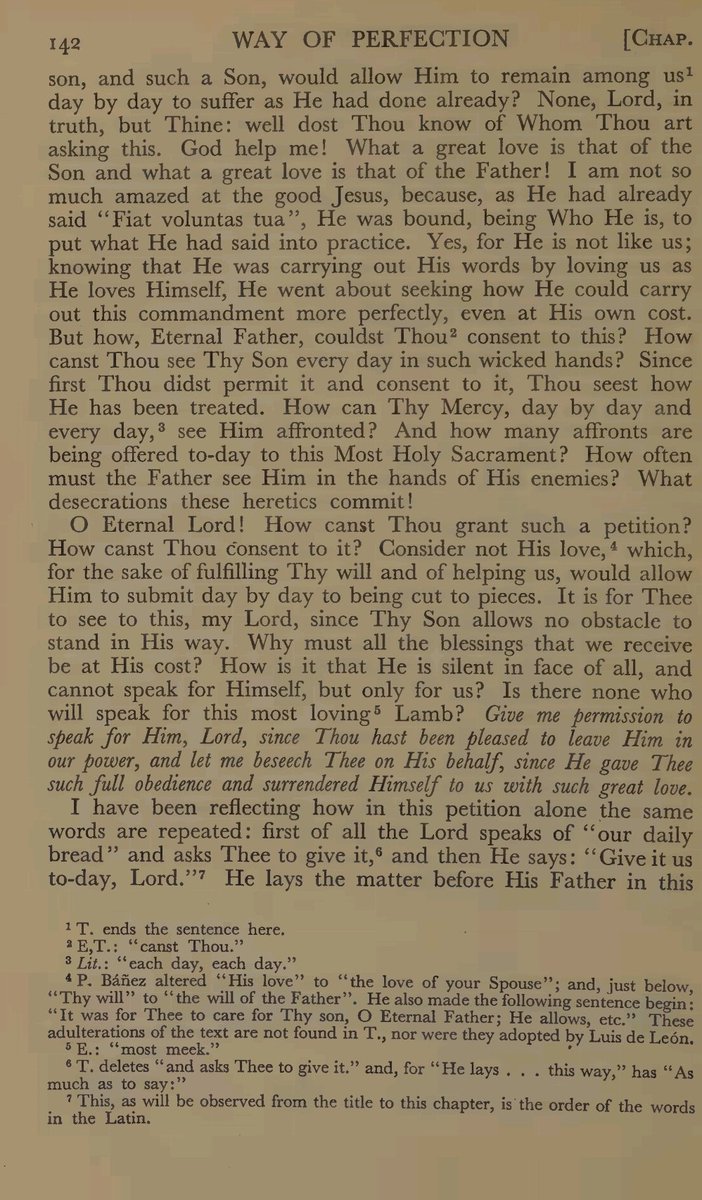

"The good Jesus knew what He had given for us and how important it was for us to give this to God, and yet how difficult it would be for us to do so, as has been said, because of our natural inclination to base things and our want of love and courage. ——
"—— He saw that, before we could be aroused, we needed His aid, not once but every day, and it must have been for this reason that He resolved to remain with us. As this was so weighty and important a matter, He wished it to come from the hand of the Eternal Father."
There also appears to be a tri-fold meaning to "this day". The day is the present. The day is the current life sustained away from sin and death. But it is also God's eternal present as the present presents from "before" and "after". 





Thus does this part of the petition enfold the parts and whole of this life in hope of the super-eternity of God which Christ, the Bread of Life (cf. John 6:25-59), gives us the grace to continue into.
(St. Bonaventure, Commentary on the Gospel of John, c. 6, n. 55-61)



(St. Bonaventure, Commentary on the Gospel of John, c. 6, n. 55-61)




Thus further is God signified in His Pure redemptive love. His vicarious sacrifice and satisfaction for sin and death on the Cross for us, and as a model for life.
"And forgive us our trespasses as we forgive those who trespass against us." (v. 12)
"And forgive us our trespasses as we forgive those who trespass against us." (v. 12)
"What can a poor creature like myself do, who has had so little to forgive others and has so much to be forgiven herself?" —St. Teresa asks herself. But she resolves that the forgiving of oneself and of others are two concerns wedded to each other in Christ. 

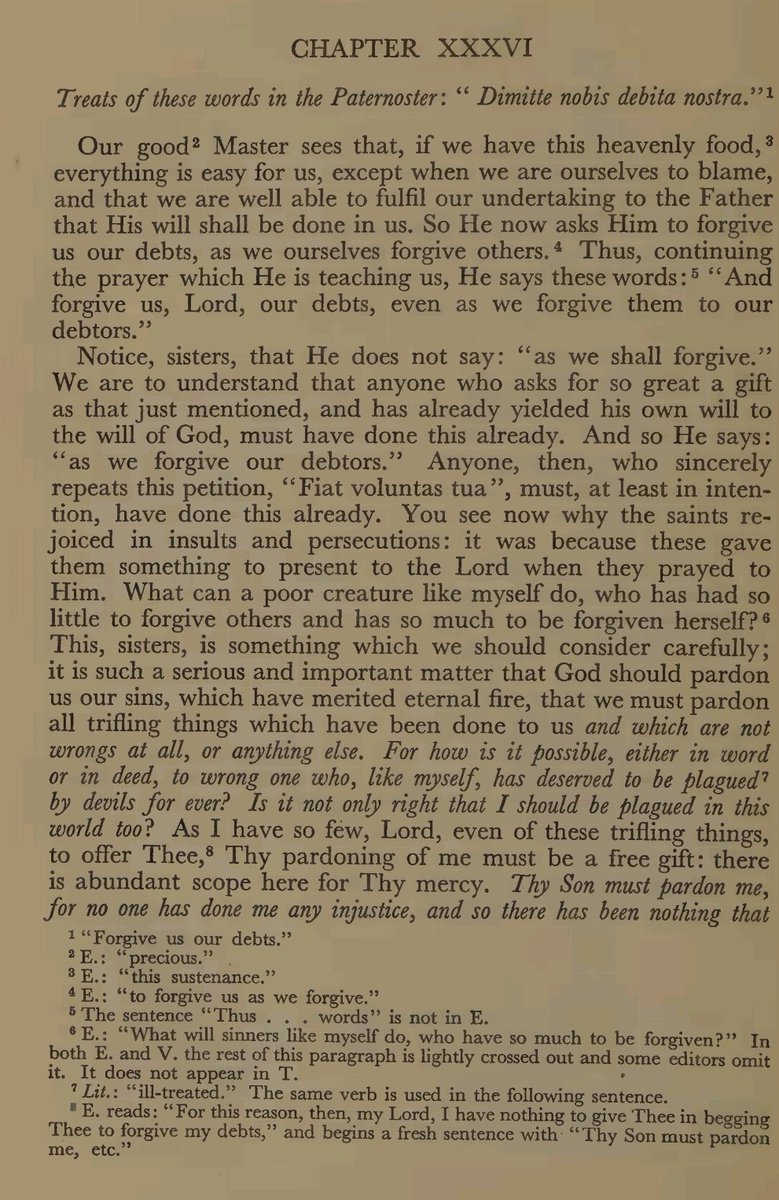
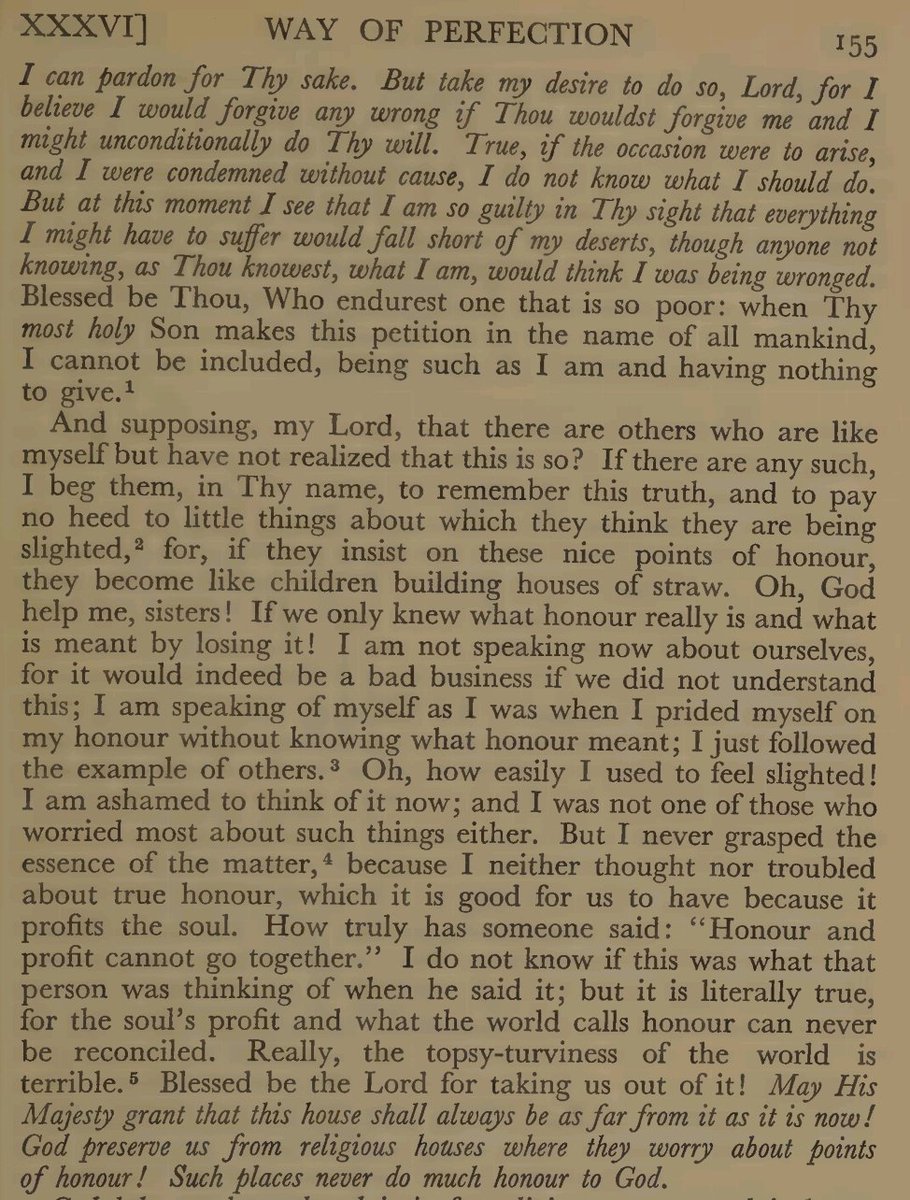
And thus God's graces to the soul which both hide the soul away in God and perfect it unto the Beatific Vision as signified.
"And lead us not into temptation, but deliver us from evil." (v. 13)
"And lead us not into temptation, but deliver us from evil." (v. 13)
Another good passage from St. Teresa in the Way of Perfection is here as she comments on this verse. "I consider it quite certain that those who attain perfection‘ do not ask the Lord to deliver them from trials, temptations, persecutions and conflicts 



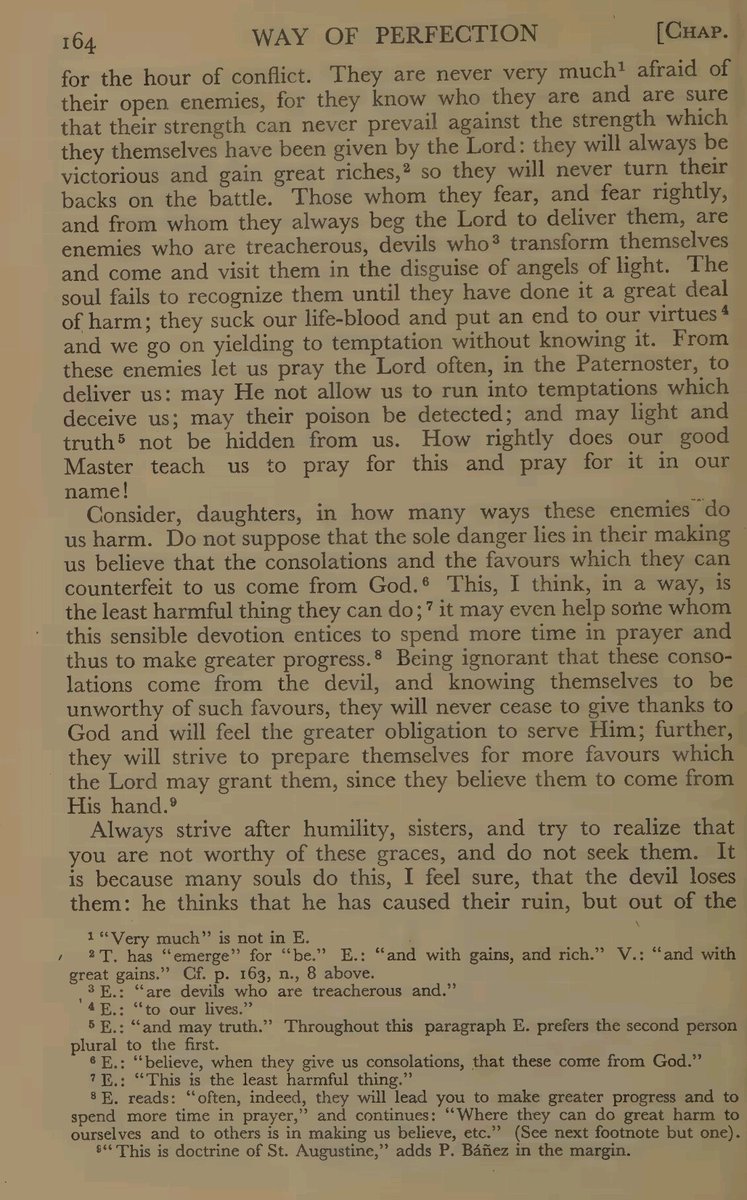

"—and that is another sure and striking sign that these favours and this contemplation which His Majesty gives them are coming from the Spirit of the Lord and are not illusions.
"For, as I said a little way back, perfect souls are in no way repelled by trials, but rather desire them and pray for them and love them.
They are like soldiers: the more wars there are, the better they are pleased, because they hope to emerge from them with the greater riches
They are like soldiers: the more wars there are, the better they are pleased, because they hope to emerge from them with the greater riches
"If there are no wars, they serve for their pay, but they know they will not get very far on that. Believe me, sisters, the soldiers of Christ—namely, those who experience contemplation and practise prayer!
—are always ready for the hour of conflict.
—are always ready for the hour of conflict.
"They are never very much! afraid of their open enemies, for they know who they are and are sure that their strength can never prevail against the strength which they themselves have been given by the Lord:
"they will always be victorious and gain great riches, so they will never turn their backs on the battle."
Thus does St. Teresa interpret "deliver us from temptation" as prayer of hope in victory:
Thus does St. Teresa interpret "deliver us from temptation" as prayer of hope in victory:
"From these enemies let us pray the Lord often, in the Paternoster, to deliver us: may He not allow us to run into temptations which deceive us; may their poison be detected; and may light and truth not be hidden from us.
"How rightly does our good Master teach us to pray for this and pray for it in our name!" (c. 38)
Entirely Divine, the Our Father Thus contains enfolded within it the whole preparation of the soul for perfect prayer and infused contemplation. The the efficacy of the smallest petition to the highest ecstasies of mystical union. 



To pray it well, as I was told by a Carmelite a few years ago, is to pray it slowly, and gently either confidence.
It should seem thus quite clear why such care is due, as such sublimity as is God's is diffused through it.
It should seem thus quite clear why such care is due, as such sublimity as is God's is diffused through it.
As St. Teresa begs the Father, "Give me permission to speak for Him, Lord, since Thou hast been pleased to leave Him in our power, and let me beseech Thee on His behalf, since He gave Thee such full obedience and surrendered Himself to us with such great love."
Other prayers and devotions oftrn have such Divine Origin as the Rosary from Our Lady to St. Dominic, the Holy Face to Sr. Mary of St. Peter which St. Thérèse championed, the Immaculate Heart from Our Lady of Fatima, the Infant Jesus to Ven. Fr. Cyril. 







Wholly Divine they can only make us Divine and bring us to God.
May Our prayers in what they signify for God and Our Lady bring us to God through Our Lady.
Amen.
May Our prayers in what they signify for God and Our Lady bring us to God through Our Lady.
Amen.
• • •
Missing some Tweet in this thread? You can try to
force a refresh






